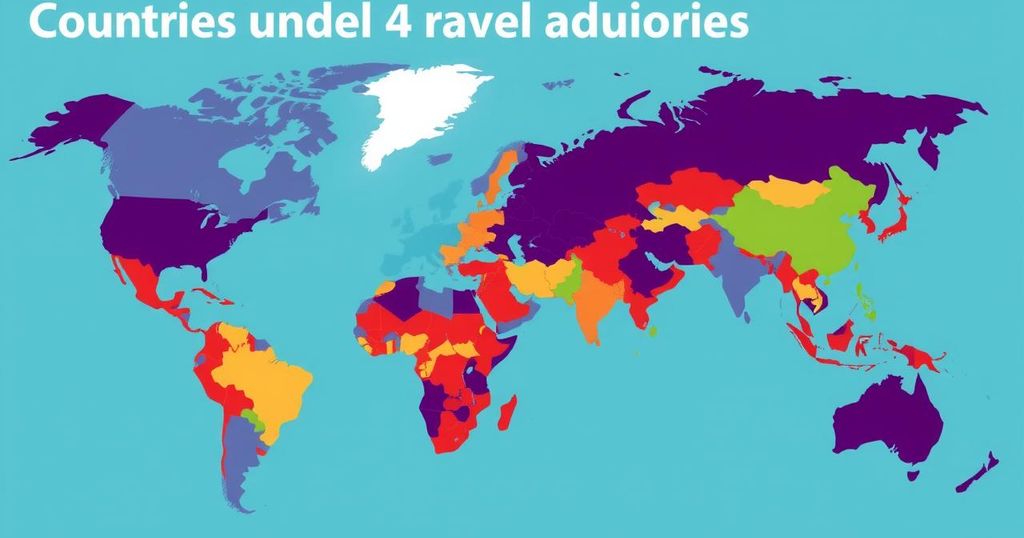The U.S. Department of State has issued Level 4 “Do Not Travel” advisories for several countries amid rising crime, political instability, and violence. Notable countries include Afghanistan, the DRC, Lebanon, Iraq, Ukraine, Venezuela, Haiti, and Iran, with these advisories aimed at protecting American citizens while traveling. Potential travelers are urged to stay informed and prioritize safety as they prepare their travel plans for the upcoming spring break season.
The U.S. Department of State has recently intensified travel warnings for several countries, issuing Level 4 “Do Not Travel” advisories for nations including Russia, Jamaica, Colombia, Belarus, Yemen, Syria, and others. These advisories are primarily due to significant concerns surrounding crime, political instability, and various forms of violence as spring break approaches, fundamentally altering how American travelers perceive these popular destinations.
Traditionally, these countries have drawn millions of American tourists, thanks to their cultural heritage and natural beauty. However, growing security concerns, including armed robberies and civil unrest, have prompted the U.S. government to recommend enhanced safety measures for its citizens traveling to these areas, reflecting a concerning rise in violent crime.
The U.S. Department of State employs a travel advisory system, which includes four levels. A Level 4 advisory is issued when the risks associated with a destination are deemed excessively high, often due to conflict, political troubles, or extreme conditions that threaten the safety of both locals and visitors.
Many nations are under Level 4 advisories as of February 2025. Countries such as Afghanistan face extreme danger due to ongoing conflict, especially related to the Taliban, resulting in widespread violence and a nearly nonexistent healthcare infrastructure. Consequently, American travelers are strongly cautioned against visiting.
The Democratic Republic of the Congo (DRC) experiences persistent conflict, particularly in eastern regions, with armed groups frequently committing acts of violence. The advisories highlight the risks of civil unrest and criminal activity, strongly discouraging any U.S. travel to the DRC.
Lebanon confronts political unrest and economic challenges, leading to instability and heightened security risks, particularly for tourists. The risk of terrorist activities near the Syrian border exacerbates the situation, prompting U.S. authorities to issue a Level 4 advisory, advising against travel.
In the Central African Republic, ongoing armed conflicts pose significant threats to safety, with virtually no law enforcement present to safeguard travelers. The U.S. Government explicitly advises against any travel to this dangerous region due to escalating violence and healthcare inadequacies.
Belarus has experienced years of political oppression under President Alexander Lukashenko’s regime, creating a hazardous environment for visitors. U.S. travelers risk harassment and political entanglements, leading to strenuous cautionary travel advisories.
Iraq remains perilous primarily due to the presence of ISIS and other armed groups, maintaining a precarious security situation, especially in regions beyond the capital. The U.S. government also advises against all travel to Iraq due to ongoing violence.
The war in Ukraine has resulted in a severe security crisis, with American citizens faced with the potential of active combat engagements. Travel is strongly discouraged until the situation stabilizes.
Venezuela grapples with an acute political and economic crisis, marked by human rights violations and safety risks, leading to a significant breakdown in public services. The U.S. has thus advised against travel due to extreme security concerns.
Haiti is similarly affected by widespread gang violence, with kidnappings being a common threat. The lack of law enforcement and healthcare accessibility pose additional risks to potential travelers, prompting a Level 4 travel warning.
In Iran, political unrest and risks of detainment for foreign nationals present a tense atmosphere for travelers. The U.S. government has consistently recommended against travel to Iran due to these considerable risks.
Common features of countries under Level 4 advisories include conflicts and civil instability, resulting in an environment where traveler safety is significantly at risk. It is crucial for potential travelers to acknowledge these advisories and to make informed decisions regarding their travel plans.
Despite the risks presented by dangerous travel destinations, it is essential for travelers to stay informed. Recommendations include consulting with the U.S. State Department, enrolling in the Smart Traveler Enrollment Program, acquiring travel insurance, and maintaining contact with local embassies to ensure safety while traveling.
The rising number of Level 4 advisories is set to impact the travel industry notably. Tour operators and airlines must monitor security updates to provide travelers with current information about destinations, while increased demand for travel insurance covering emergencies may rise as a consequence of these advisories. Overall, there remains a delicate balance between travelers’ desires to explore and the realities of significant safety risks during this period.
As the spring break season approaches, American tourists should acknowledge the heightened risks in certain destinations in Latin America and the Caribbean. The ongoing issuance of Level 3 and Level 4 travel advisories emphasizes the need for informed decision-making and enhanced awareness of traveling security.
The issuance of Level 4 travel advisories highlights increasing safety risks for American travelers to various nations characterized by crime, political unrest, and violent conflicts. It is imperative that potential travelers heed these warnings and prioritize their safety. As the travel industry adjusts to these advisories, informed and cautious planning remains essential for individuals seeking enjoyable travel experiences amidst these global challenges.
Original Source: www.travelandtourworld.com




